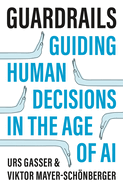
There's an onslaught of both information and misinformation bombarding people as they make critical and irrevocable decisions, personally and globally. How should we make use of the mechanisms available to ensure that global citizens make safe, rational, and responsible decisions? What are the consequences of replacing human decision-making with artificial intelligence and algorithmic choices? How do we balance free speech with the collective good in the face of new technologies? These are the crucial questions painstakingly considered in Guardrails: Guiding Human Decisions in the Age of AI.
Viktor Mayer-Schönberger (Delete), professor of Internet governance and regulation at the University of Oxford, and Urs Gasser (Born Digital, with John Palfrey), professor of public policy, governance, and innovative technology at the Technical University of Munich, argue that the distinctly human ability to understand context and change needs to be explicitly preserved and protected in the form of guardrails (laws, governance, etc.) and not be outsourced completely to technology. "Letting technology do the work" could erode the ability of humans to "assess the truthfulness of information" and, they write, could lead us to "shed resilience and the capacity to adapt."
The authors provide fascinating historical anecdotes, including the case of double agent Joe Cassidy, whose passing of fraudulent information to the Soviets may have inspired them to make actual gains in chemical warfare. Additional stories tell of cases of biases, both human and algorithmic, leading to things as disparate as discrimination in the housing market, catastrophic disasters in aviation, and polar exploration. Guardrails is nothing short of critical guidance for navigating life in the 21st century. --Elizabeth DeNoma, executive editor, DeNoma Literary Services, Seattle, Wash.

